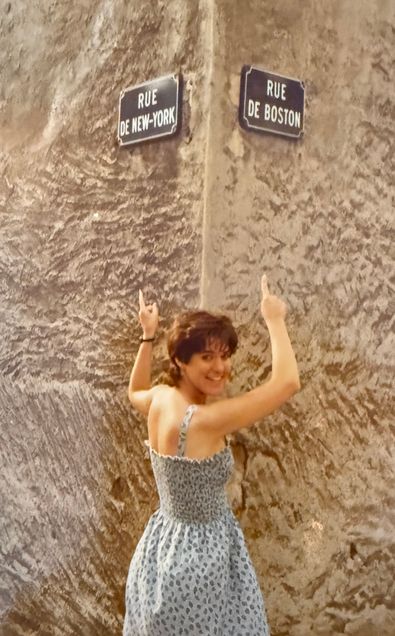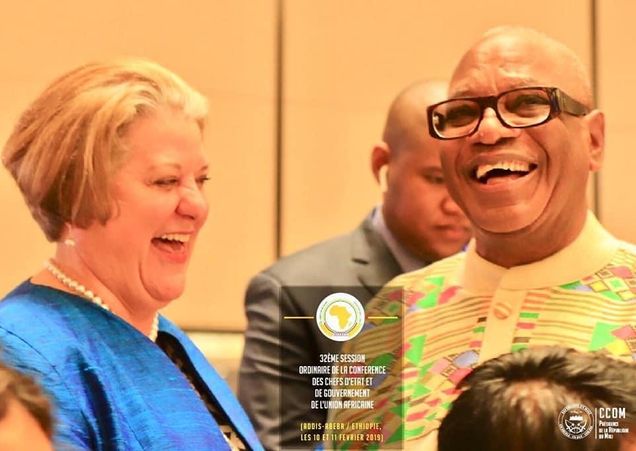A Diplomatic Journey Rooted in Curiosity and Language
2025 Distinguished Alumni Awardee: Mary Beth Leonard (CAS’84)
2025 Distinguished Alumni Awardee: Mary Beth Leonard (CAS’84)
Mary Beth Leonard (CAS’84) didn’t set out to become a diplomat. But a passion for the French language and a curiosity about the world beyond Worcester, Massachusetts, led her to a distinguished career in the U.S. Foreign Service.
Since graduating from BU in 1984, Leonard has served as the U.S. Ambassador to Nigeria and Mali, and as the U.S. Representative to the African Union. This fall, in recognizion of these outstanding accomplishments, she will be honored with a 2025 Boston University Arts & Sciences Distinguished Alumni Award.

“In high school, I was pretty good at French, and I remember having conversations with myself about what I might possibly do with that,” she recalls. “I had fun in the Foreign Service almost every day for over 30 years. It’s a deeply rewarding career and lets you see countries in ways tourists never do. I felt really privileged to have experienced it!”
Leonard grew up in Worcester in a family that didn’t have any particular international bent; she was the first person in her family to hold a passport, which she obtained for a high school music trip to Ireland. She chose Boston University for its generous financial aid—and the chance to experience city life just an hour from home.
“My father, a very practical man, said, ‘There are all these good colleges here in Worcester—why would you need to go away?’”But BU wasn’t so far, and I was eager for the opportunity to flee my home for the big city,” Leonard recalls. “So to BU I came.”

As an undergraduate, Leonard majored in economics and minored in French. She lived in Warren Towers her first year, then moved to La Maison Française, where she found a community of globally curious students. She spent her senior year as an au pair for a BU faculty family—her host mother was director of the study abroad office, and her host father was dean of the College of Liberal Arts (now Arts & Sciences). Their home was filled with conversations about the wider world.
Her academic interests deepened during a junior year abroad in Grenoble, France, and through courses in African history and development economics. “I realized I could combine my French skills with a passion for development economics in Africa,” she says. “That was the first step in a series of choices that led me to this career.”

After graduation, Leonard worked as an analyst for the Department of Defense in Washington, D.C., and began graduate studies at Johns Hopkins University’s School of Advanced International Studies (SAIS). She joined the Foreign Service in 1988, launching a career that took her to Cameroon and Namibia—where she arrived just months after independence—followed by roles in the State Department’s operations center and as a desk officer for Central African Affairs.
“Joining the Foreign Service is a big transition,” she says. “You’re thrown into unfamiliar places and expected to figure things out.”
One of her proudest accomplishments came during her ambassadorship in Mali, when she helped organize the extradition of a Malian national who had murdered a U.S. government employee in Niger. “It was deeply personal for me, because I could translate the Niger victim to the person who held that role in my own embassy,” she says. “I was grateful we succeeded.”

Leonard later served as the State Department’s diplomat in residence for New England, based out of Tufts University, before being appointed by President Obama as U.S. Ambassador to the African Union. “It felt like the culmination of decades of work on Africa,” she says. In that role, she supported the AU’s efforts to share best practices across peace, security, agriculture, and health, and helped advance economic integration through supporting AU initiatives like the African Continental Free Trade Area.

Reflecting on her career, Leonard says there was no “single lightning moment” that led her to diplomacy—just a series of decisions that helped her develop adaptability and judgment and pushed her to the next stop on the road.
She remembers flipping through a State Department brochure with a friend in high school and reading sample questions from the Foreign Service exam. “We thought, ‘Oh, we could so pass this test.’ At the time, that probably wasn’t true—but luckily, it turned out to be true several years later.”
When she speaks to students, she shares that her path toward an international career began the day she packed up from La Maison Française, got a summer job to save a little money, and then spent a year studying abroad.
“Spend time figuring out the intersection of what interests you and what you’re good at, and then connect those dots to see where they will lead,” she says. “That process repeated itself for me across my early post-college days and throughout my career—and it will for the current generation of students, too.”